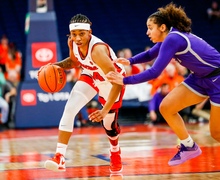TENNIS : Syracuse exploits opponents’ weaknesses in wins over Temple, Rutgers
Up 8-7 in games and tied 30-30 in the deciding No. 2 doubles match against Rutgers, Maddie Kobelt failed to complete a quality return serve over the net, putting Syracuse in a 30-40 hole. If Kobelt and Aleah Marrow lost the next point, the match would go to a 10-point tiebreaker, with the doubles point on the line.
But they got some help from the Scarlet Knights.
RU’s Stefania Balasa and Noor Judeh botched the return on the next point, hitting the net and squaring the game at deuce. Rutgers made the same mistake for the next two points, giving Syracuse the doubles point and momentum going into singles play.
‘That was definitely really big for us to pull that out,’ Kobelt said. ‘I knew it was close, and it was a big help for us to have that doubles point.’
With the doubles point secured, Syracuse went on to split the singles matches and win 4-3, avenging last season’s loss at Rutgers. On the heels of a 6-1 victory over Temple on Saturday, the Orange is now on a five-match winning streak, which helps justify its new national No. 73 ranking.
Syracuse may not have dominated with its play this weekend, but the team repeatedly demonstrated an ability to outlast the opposition. For a nationally ranked team, that is expected.
For head coach Luke Jensen, the Temple and Rutgers matches showed the team’s capability to win without its A-game.
‘We’ve got to start out quick, and we’ve got to start out confident, and we’ve got to finish that way,’ Jensen said. ‘We’ve got to be better. We’ve been playing down to the level of our competition.’
Although Kobelt took control of her singles match from the beginning, she was forced to play a variety of shots to wear down her opponent, Morgan Ivey. Kobelt won 6-1, 6-2, staying in control by hitting low liners that kept Ivey close to the ground and combining precision with power.
Up 5-2 in the second set, Kobelt’s last game was a microcosm of her match. After being caught out of position on the first point, Kobelt won four points in a row to win the match. After an ace made it 40-15, Kobelt closed out Ivey by driving a low, hard serve that forced a long return.
‘Working on early adjustments here and there, and trying new strategies, has helped me,’ Kobelt said. ‘We keep winning our matches here, and it will carry over.’
Emily Harman continued her hot play of late, winning her ninth consecutive match at No. 1 singles, 6-3, 6-3 over Jennifer Holzberg. By the end of the match, Harman’s strategic expertise wore on Holzberg. Harman’s constant change of direction kept Holzberg moving around, and Holzberg was forced to play from the backcourt for the majority of the second set.
Going into the Rutgers match, Harman said she wanted to focus on hitting different areas of her opponent’s court to keep Holzberg guessing.
‘I just wanted to keep the ball low, keep the ball high, go in, stay back,’ Harman said. ‘I didn’t want to give her the same thing twice.’
Rather than give in to the tempo of her opponent’s game, Harman maintained her mentality of finding control of the match on her own and not relinquishing it. As long as she could play the way she intended, coming out with a victory was an attainable goal.
‘I wanted to focus on my shots today and not really worry what she was doing,’ Harman said. ‘I knew if I made the shots that were on my mind, that I wanted to do, then it wasn’t going to be too much.’
Syracuse lost to Rutgers last year in its only Big East defeat of the season. As a result, Sunday’s match became a little more personal than most, Jensen said.
‘For Rutgers it is extremely personal,’ Jensen said. ‘We’ve gone back and forth, and they’ve ripped our guts out a couple times, and we’ve ripped out theirs.’
Last year, the Scarlet Knights won the doubles point and went on to win 4-3. This year, the Orange did the same.
Jensen said the team’s ability to persevere and fight for the last few points will serve it well in the coming weeks and will prove beneficial with formidable opponents ahead.
‘When you get in these competitive situations, it’s the team that’s going to be able to come through in the critical points,’ Jensen said. ‘Here, the sophomores came through in the clutch. Even though we didn’t play our best tennis, you’ve got to win and move on.’
Published on February 19, 2012 at 12:00 pm
Contact Kevin: kmprisei@syr.edu





